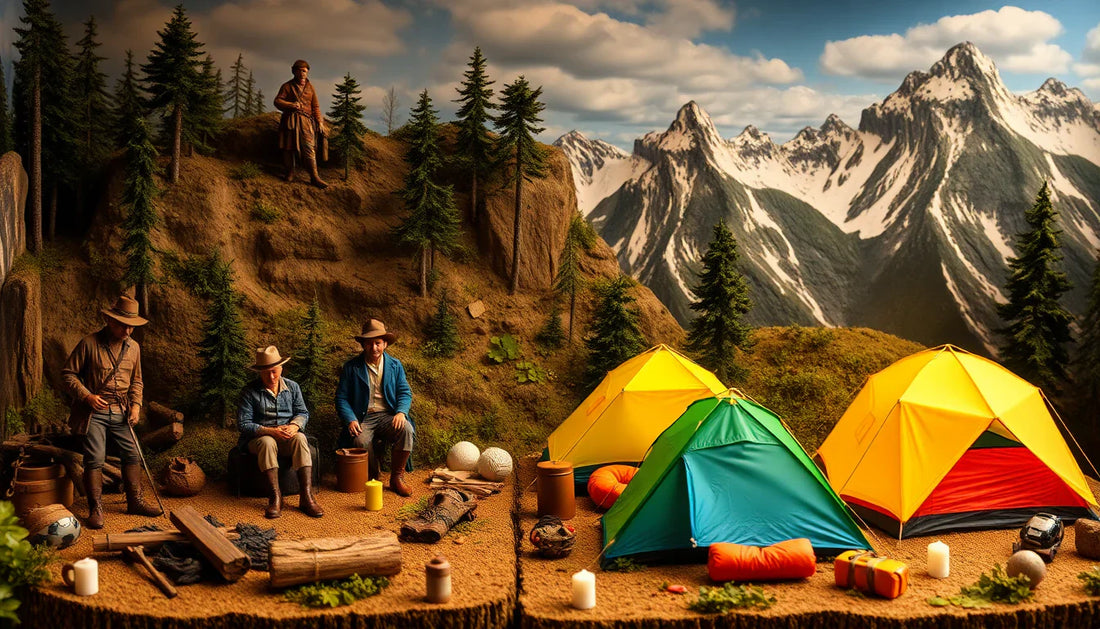
The History of Camping: From Survival to Recreation
Share
Camping has long been a fundamental part of the human experience, evolving from a necessity for survival to a cherished recreational activity. As we delve into the rich history of camping, we uncover a fascinating journey that has shaped our relationship with the great outdoors.
Early Survival Camping
The roots of camping can be traced back to the dawn of human civilization, when our ancestors were nomadic hunter-gatherers. These early humans relied on temporary shelters and the ability to live off the land as they traversed vast landscapes in search of food and resources. Camping was not a leisure pursuit, but a matter of life and death.
Indigenous cultures around the world have long practiced survival camping techniques, honing their skills to thrive in diverse environments. From the Arctic tundra to the tropical rainforests, these communities developed intricate knowledge of shelter construction, fire-making, and foraging, ensuring their survival in the face of the elements.
Transition to Recreational Camping
The shift from survival camping to recreational camping began to take shape in the 19th century, as the industrial revolution and the rise of the middle class ushered in a new era of leisure time and outdoor exploration. Pioneering figures like Henry David Thoreau and John Muir championed the benefits of immersing oneself in nature, inspiring a growing movement of camping enthusiasts.
The establishment of the first national parks, such as Yellowstone and Yosemite, further fueled the popularity of camping as a means to connect with the great outdoors. Organized camping groups, like the Appalachian Mountain Club and the Sierra Club, emerged, providing a platform for individuals to share their passion for the wilderness and promote the preservation of natural spaces.
Evolution of Camping Gear
As the demand for recreational camping grew, so too did the evolution of specialized equipment and gear. The industrial revolution brought about advancements in materials, manufacturing, and transportation, allowing for the development of more sophisticated camping tools and accessories.
Tents, sleeping bags, and cooking equipment became increasingly sophisticated, catering to the needs of both casual campers and avid outdoor enthusiasts. The introduction of lightweight, portable, and durable materials revolutionized the camping experience, making it more accessible and comfortable for a wider audience.
20th Century Camping Culture
The 20th century witnessed a significant boom in camping as a recreational activity, fueled by the rise of the automobile and the growing accessibility of national parks and other natural areas. Families and individuals alike embraced the opportunity to escape the confines of urban life and immerse themselves in the great outdoors.
The democratization of camping experiences led to the emergence of a diverse camping culture, with a range of activities and preferences catering to different demographics. From backpacking and wilderness camping to RV and glamping experiences, the options for outdoor enthusiasts expanded, reflecting the evolving needs and desires of the modern camper.
Modern Camping Landscape
Today, camping continues to evolve, adapting to the changing needs and preferences of a new generation of outdoor enthusiasts. The integration of technology, such as portable power sources and GPS-enabled gear, has transformed the camping experience, offering greater convenience and safety.
Moreover, the growing emphasis on mindfulness and the pursuit of a balanced lifestyle has led to a renewed appreciation for the restorative and rejuvenating qualities of camping. As people seek to reconnect with nature and find solace in the great outdoors, the enduring appeal of camping as a means of recreation and self-discovery remains strong.
The history of camping is a testament to the human spirit's resilience and our innate desire to explore and connect with the natural world. From its origins as a matter of survival to its current status as a cherished recreational activity, camping has woven itself into the fabric of our cultural identity, serving as a bridge between our past and our future.
As we continue to navigate the ever-evolving landscape of outdoor experiences, the lessons and traditions of our camping heritage will undoubtedly continue to shape and inspire the way we engage with the great outdoors.
